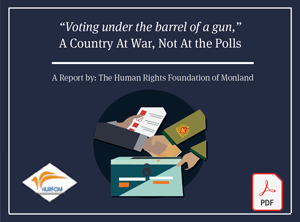Residents Dismayed over Misuse of Development Aid
March 22, 2014
The United Nations Development Programme (UNDP) works to provide support to poor communities throughout Burma, and has identified Three Pagodas Pass Township (TPP) as one of the most vulnerable communities in the country. The UNDP has agreed to support families from Ywa Thint Village, Chaung Zone, and Kyun Chaung Village in order to improve opportunities for sustainable livelihoods. Residents are dismayed that resources ear-marked for Ywa Thint village have been misappropriated by village administrator Nai Thar Ra, as he assigns the UNDP’s monetary aid to households who are not in the most need, but with whom he shares close connections.
The UNDP identifies the most vulnerable communities in Burma, and provides support to more than 60 townships throughout the country to improve the villagers’ opportunities for sustainable livelihoods. On December 2nd, 2013 the UNDP met with Nai Thar Ra to create a committee charged with the task of collecting data of poverty levels among Ywa Thint households. The UNDP selected seven individuals, who were recommended by local residents, to collect data. Committee members included U Myint Swe, from the National League for Democracy (NLD), appointed as chairman of data collection, and U Thin Myo Oo, also from NLD, as secretary.
Seven weeks later, on January 20, 2014, Nai Thar Ra unilaterally dismissed the committee members who had been selected by the UNDP, and who had been recommended by village residents, and appointed his own hand-picked members. Nai Thar Ra appointed Nai Yin Sanaing as chairman and U Aung Than as secretary of the data collection committee. Local residents were not happy with their village administrator’s actions, but did not speak out against Nai Thar Ra, for fear they would lose UNDP’s support.
After receiving the data supplied by Nai Thar Ra’s appointed committee, the UNDP decided to support the 53 most vulnerable households of the 120 household Ywa Thint village. In February 2014, each identified household was set to receive $150 USD of support, equal to 148,200 kyat. However, according to a local source, the households identified by UNDP never received any support because Nai Thar Ra redirected the aid to households with which is he closely connected, creating conflict between the village administrator and village residents.
In a letter written by a Ywa Thint resident, the “UNDP visited our village and met with the village administrator, Nai Thar Ra. [The] UNDP selected seven people for data collection, but Nai Thar Ra misused what UNDP [had] planned; he chose his people to collect the information”.
The resident goes on to explain that Nai Thar Ra’s actions lacked transparency “because he did not use real information of poor people who are [most] in need. [Nai Thar Ra] just gave the money to the house[s] that he knew well. Therefore, most villagers were not satisfied, so we want [the] responsible people at UNDP to know about [it]. We want to spread this news to get it delivered to the UNDP”.
Nai Thar Ra: a Brief Background
In 2013, village residents of TPP Township asked for the construction of a water well and cistern, and the Karen State government provided 8 million kyat to the village administration for the project. The final cost of the project, including materials, construction, and labor came to 7.6 million kyat, leaving a balance of 400,000 kyat.
Nai Thar Ra took sole responsibility for the construction and implementation of the water well and cistern, but failed to produce any invoices, or proof of money spent. Furthermore, Nai Thar Ra appropriated an additional 160,000 baht, of the village’s 183,000 baht funds, by claiming that the budget supported by the Karen State government was not enough. The village administration committee and local residents were opposed to this decision. Furthermore, although the well has been constructed, not all villagers receive water because some pipes were not installed.
The village had acquired its 183,000 baht in funds from selling a 120,000 baht plot of village land, a 30,000 baht plot of land at the top of the village, 21,000 baht from selling a tree, and 12,000 baht from selling extra land beside the road.
Nai Thar Ra was appointed village administrator in 1992. Since his appointment, he has sold public primary school land, which was included in the 2000 land map, to private businessmen for his own gain. The school committee and teachers informed authorities, but Nai Thar Ra drafted a new map of the land to conceal the incongruities. U Myint Swe, U Kyi Myint, U Myo Oo, U Aung Htay and U Myint Aye presented the 2000 and 2014 land maps to the Land Records Department to investigate the case, and will appear before the Lands Records Department on March 2, 2014.
Comments
Got something to say?
You must be logged in to post a comment.




















































